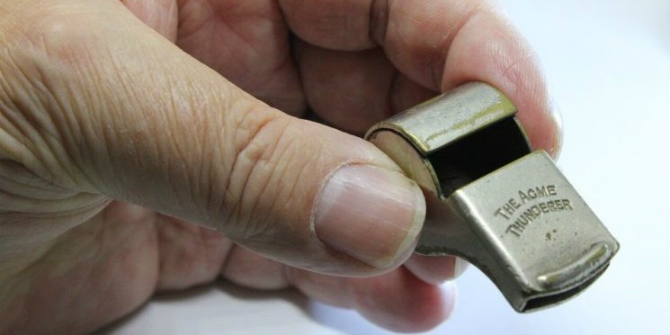 Now we know: a deal – any deal – is clearly better than no deal. After a frantic overnight scramble to agree the wording and the Prime Minister’s dramatic early hours’ flight to Brussels, the EU’s leaders are now willing to draw a line under phase one of the Brexit negotiations. Below, Iain Begg (LSE) explains the deal that has been struck in more detail.
Now we know: a deal – any deal – is clearly better than no deal. After a frantic overnight scramble to agree the wording and the Prime Minister’s dramatic early hours’ flight to Brussels, the EU’s leaders are now willing to draw a line under phase one of the Brexit negotiations. Below, Iain Begg (LSE) explains the deal that has been struck in more detail.
Whistling up a deal?
Unless something unravels, we can expect the European Council, meeting on the 14th and 15th of December, to fire the starting-gun on negotiations about the future relationship between the UK and the EU. True, the fifteen-page document summarising what was agreed does state, twice, the ‘caveat that nothing is agreed until everything is agreed’, but there is unlikely to be any appetite for prolonging the agony.
Theresa May can take credit for bringing matters back from the brink by finding a formula to placate the DUP and agreeing to go well beyond what she offered as a financial settlement in her Florence speech, barely two months ago. She seems, so far, also to have seen off the hardliners in her own party. However, in classic EU style, there are fudges and ambiguities in the text, some of which may come back to haunt her.
On Ireland, the language about the commitment to the peace process and the Good Friday agreement is stirring and there is an unequivocal statement of the UK’s ‘guarantee of avoiding a hard border’. This sits alongside a statement that ‘the United Kingdom will ensure that no new regulatory barriers develop between Northern Ireland and the rest of the United Kingdom’ without the agreement of the Northern Ireland authorities.
The text refers to achieving these twin aims through the ‘overall EU-UK relationship’, but what is far from clear is how. The inexorable logic of the UK not being in the customs union and having no barriers between Northern Ireland and Great Britain still applies: there has to be some form of border in Ireland. The solution proposed is that ‘in the next phase work will continue in a distinct strand of the negotiations on the detailed arrangements required to give them effect’. To revert to a metaphor often heard during the years of the euro crisis, the can has been kicked down the road.
the UK has largely caved-in to what the EU had demanded
When it comes to the divorce bill, the UK has largely caved-in to what the EU had demanded from the outset by agreeing ‘a methodology for the financial settlement’. There is no explicit figure for how much, but finance ministers in other EU countries will have a pretty shrewd idea of what it means for them.

Briefings from No. 10 suggest the overall amount, to be spread over many years, may be just shy of £40 billion. The modest rise in the value of sterling this week helps because it means (at today’s exchange rate) fewer pounds will be needed to pay the bill, but the suspicion has to be that the eventual figure will be somewhat higher given what is detailed in the ‘methodology’.
Key elements of the deal are left deliberately vague. For example, in a major concession compared with the Florence speech, the UK has now accepted ‘it will contribute its share of the financing of the budgetary commitments outstanding at 31 December 2020’. This leaves open what the relevant share is.
Similarly, hidden away in footnote 9 of the document is a technical statement about the assumptions regarding the interest rate to be used to calculate the EU’s lability for staff pensions, although the mere presence of the footnote must be interpreted to mean the UK has accepted it will have to pay. In essence, if interest rates return to more normal levels, a lower pension pot will be enough to generate the income required to pay retired EU staff.
For the EU, facing the prospect of acrimonious negotiations about how to fill the hole left in its budget by the departure of the UK, a figure of the order of €40-50 billion will be a great relief. In round numbers, it will mean no need to fret for at least four years about whether the other net contributors have to pay more or recipients receive less.
In Brussels, they’ll be whistling now, but the tune will be Beethoven’s ode to joy
The EU, as many will recall, was once told it could ‘go whistle’ for the money. In Brussels, they’ll be whistling now, but the tune will be Beethoven’s ode to joy.
This post represents the views of the author and not those of the Brexit blog, nor the LSE. It first appeared on The UK in a Changing Europe.
Iain Begg is Professorial Research Fellow at the European Institute and Co-Director of the Dahrendorf Forum, London School of Economics and Political Science, and Senior Fellow on the UK Economic and Social Research Council’s initiative on The UK in a Changing Europe.







No doubt the EU are very pleased with the outcome as are the British side. Agreement has been reached and neither side has had to make painful concessions. What’s not to like?
In the end Brexit can benefit everyone. The UK because it doesn’t want to be part of the single currency or a federal Europe and because the flavour of free trade that the EU offers isn’t particularly well suited to the present UK economy. And the 27 because they can now push ahead with further integration without the UK endlessly carping on the sidelines. Again, what’s not to like?
– and have you noticed how the extreme right all over europe and the uk is gaining traction?
– when you try to circumvent the majority, and overturn referendums, you will just push ext. Right wing votes.
– then, wether you like it or not, brexit will be fully achieved, now or in 5 years time.
Wars were fought for these type of events, and manipulating, and you will get a taste of that.
Does the 40bn incude the 20bn for remaining a member in all but name dring the 2year transition period that would have been payable if we were a member then anyway?
Those like Simon McKeown above who think everything is fine and dandy and “taking back full control” is on the way to being achieved should realise what has happened this week. The belated recognition has dawned that the signing of the Good Friday Agreement, its entrenchment by referendum North and South and its registration at the UN as an international treaty removed the right of the UK (and Ireland for that matter) to secede unilaterally from EU standards – at least as far as the island of Ireland is concerned. The DUP have now succeeded (whether they really intended that or not) in extending this to the entire UK . It remains to be seen how precisely that situation is reflected in the rest of the negotiations but one thing is sure – no UK government can escape the fact that the Good Friday Agreement shackles the “taking back of control” by not just this parliament but (sorry Michael Gove) any British parliament elected to replace it.
If you read what was agreed yesterday you will see that alignment is only guaranteed for regulatory areas that affect the border and then only if there has been no alternative agreement. Exactly what areas affect the border is moot but clearly not all those of the wider UK economy. Alignment isn’t total even now – duty and VAT vary – so a degree of divergence will clearly be tolerated even in regulations which do affect the border.
@Simon McKeown
As I understand it there are about 142 areas affecting the border and NI/Irish co-operation . You are correct to mention the reference to no alternative agreement. But what that means is that any such alternative agreement would have to contain the appropriate alignment. The purpose of yesterday’s statement was to establish that this alignment in relation to areas affecting the Irish border would apply even if the UK crashes out with no deal whatsoever.
It does not seem to be understood that any “deep and comprehensive” free trade agreement with the EU, as sought by the UK government, would inevitably contain a high degree of alignment with single market and customs union rules – how could it be otherwise?
There is even fudge in the text that means that in the case of no deal that the agreement to maintain regulatory alignment is no longer valid. The author mentions it in the first paragraph “Nothing is agreed until everything is agreed.” ergo the agreement to keep regulatory alignment is not agreed until a deal is agreed.
This politicians are they not slippery indeed.
Point taken, ralphmalph, but my contention is that the requirement for “alignment” derives not just from any UK/EU divorce agreement but also from the Good Friday Agreement.